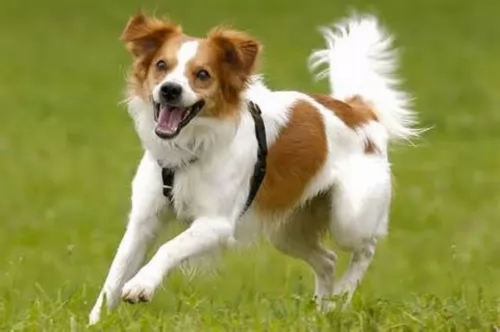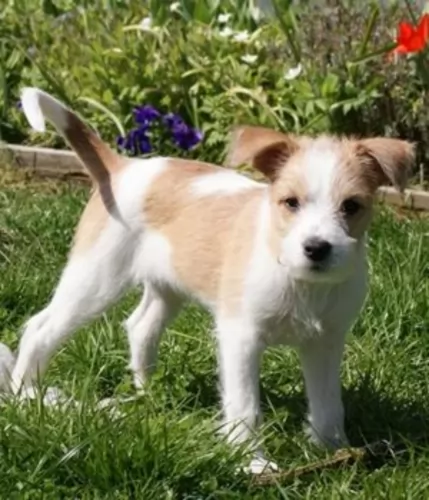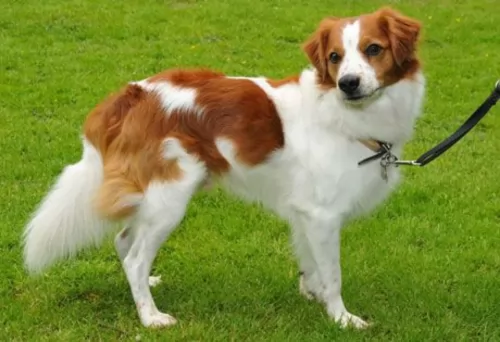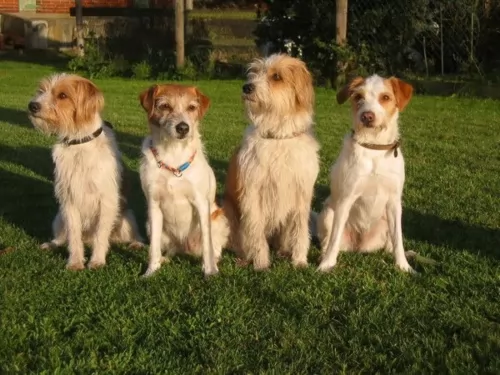 Petzlover
Petzlover Kromfohrlander is originated from Germany but Samoyed is originated from Russia. Kromfohrlander may grow 14 cm / 5 inches shorter than Samoyed. Kromfohrlander may weigh 14 kg / 30 pounds lesser than Samoyed. Both Kromfohrlander and Samoyed has almost same life span. Both Kromfohrlander and Samoyed has almost same litter size. Kromfohrlander requires Low Maintenance. But Samoyed requires Moderate Maintenance
Kromfohrlander is originated from Germany but Samoyed is originated from Russia. Kromfohrlander may grow 14 cm / 5 inches shorter than Samoyed. Kromfohrlander may weigh 14 kg / 30 pounds lesser than Samoyed. Both Kromfohrlander and Samoyed has almost same life span. Both Kromfohrlander and Samoyed has almost same litter size. Kromfohrlander requires Low Maintenance. But Samoyed requires Moderate Maintenance
 Many troops of World War 1 and World War II would have some or other mascot that they would keep close to them as a reminder of home. The mascot would also inspire them, giving them hope to endure.
Many troops of World War 1 and World War II would have some or other mascot that they would keep close to them as a reminder of home. The mascot would also inspire them, giving them hope to endure.
A Kromfohrlander dog, ‘Original Peter’ was one such mascot – a scruffy Terrier-type dog that army troops from the USA found in France.
This particular dog was accidentally mated with a Fox Terrier, with the breed essentially developing from the military dog from the 1940s. After 10 years of development, the Federation Cynologique Internationale accepted the breed in August, 1955.
It is still a rare breed, being found mainly in Germany.
 The Samoyed is a large breed of dog; a spitz-type dog, with a thick, double-layer coat. The dog was used to help with herding and to also haul sledges for the Siberian Samoyede people.
The Samoyed is a large breed of dog; a spitz-type dog, with a thick, double-layer coat. The dog was used to help with herding and to also haul sledges for the Siberian Samoyede people.
The Samoyed has been used in polar expeditions, including Sir Ernest Shackleton's journey to the Antarctic. They’ve put up with a lot of hardships on these journeys and some of them have lost their lives on these expeditions.
The first standard for the breed was adopted in England in 1909, and in 1923 the original Samoyed Club of America was established.
 Fondly referred to as the Kromi or the Lander, the purebred Kromfohrlander, known as a companion dog, is medium sized.
Fondly referred to as the Kromi or the Lander, the purebred Kromfohrlander, known as a companion dog, is medium sized.
Both males and females stand at roughly 38 – 46cm in height and they weigh about 9 – 16kg.
They have two different coat types – the smooth haired one and the rough haired one, both coming with a soft undercoat. The dog is a moderate shedder. If you really want to be smart then the smooth coat is referred to as Glatthaar and the wire-haired Rauhaar. The color of the coat is white with brown, orange tan markings with the ears and part of the face mostly covered in the brown/tan markings.
The head of the dog is fairly round shaped and he has half-erect, half floppy ears. His legs are straight and firm and the medium length isn’t docked.
The Kromfohrlander is known for being a loving family pet that loves nothing more than staying within reach of one of his human family members. This closeness with his people means that he can adapt to life in the city or the countryside, so long as he is with his humans.
Wherever he lives though, because he is such an active dog he will require a good dose of mental- and physical stimulation. He is a docile dog, but not timid and not aggressive either, being friendly and amicable by nature. He makes a great playmate for children and is willing to get along with other pets in the home too.
 The Samoyed is a large herding dog standing at between 48 to 60cm in height and weighing 16 – 30kg. He has a thick, double layer coat that is silvery white.
The Samoyed is a large herding dog standing at between 48 to 60cm in height and weighing 16 – 30kg. He has a thick, double layer coat that is silvery white.
The top layer is fairly long and coarse. The dog sheds heavily once or twice a year, but the dog is described as being hypoallergenic.
The ears of the dog are typical spitz-like – erect. The eyes of the dog are almond in shape and while they are usually brown, they can sometimes be blue too. The tail is long and curls over the dog’s back. When these dogs sleep in the snow, you might notice the tail is folded so that it covers the dog’s nose.
The Samoyed is a friendly dog, to such an extent that you wouldn’t call him a good watchdog. They’re friendly dogs with happy expressions on their faces. They make great family pets and will get on well with children as well as other dogs in the home.
Like all dogs, the Samoyed will need early training and socialization to make him obedient and well rounded. He is intelligent and can easily learn a few basic commands.
 The Kromfohrländer is one of those dogs that has been bred specifically to be man’s best friend.
The Kromfohrländer is one of those dogs that has been bred specifically to be man’s best friend.
When you delve into his history you see that he has never had any particular role as a working- or hunting dog but that he has been bred to be a companion animal.
He can’t be left alone for too many hours as his very nature makes it that he longs to be around his human family constantly. He is therefore not a dependant dog, relying totally on his human family for his sense of well-being.
Low maintenance, easy-going, loving, devoted, lively and social, when you bring the medium-sized Kromfohrlander into your home, it won’t be long before he will have crept into your heart as well.
 The Samoyed is a gentle, easy going dog that gets on well with everyone, loving children and being prepared to be friendly towards other dogs too.
The Samoyed is a gentle, easy going dog that gets on well with everyone, loving children and being prepared to be friendly towards other dogs too.
His friendliness makes it that he doesn’t make a good watchdog. He is intelligent and can be trained to obey basic commands.
He loves plenty of exercise, after all he has always been a working dog. Apart from the coat which will require quite a bit of upkeep, the Samoyed is prepared to come into your home and make you a splendid pet and companion.
 Feisty, energetic, full of life, entertaining and comical, your Kromfohrlander is intelligent too and with good care, exercise and lots of love your dog will maintain all these good characteristics and reach anything from 12 to 16 years of age.
Feisty, energetic, full of life, entertaining and comical, your Kromfohrlander is intelligent too and with good care, exercise and lots of love your dog will maintain all these good characteristics and reach anything from 12 to 16 years of age.
However, there are some dog illnesses that could affect your dog such as hip dysplasia, ear- and eye infections such as lens luxation which can actually cause loss of vision, cancer, diabetes, epilepsy, bloat and others.
Dogs that are ignored in terms of getting enough exercise are prone to weight gain and this in itself can lead to joint disease and other illnesses.
 Dogs can get diabetes just like people can. Diabetes is becoming more common in dogs as people try and feed their dogs ‘treats’ such as chocolates, biscuits and ice-cream.
Dogs can get diabetes just like people can. Diabetes is becoming more common in dogs as people try and feed their dogs ‘treats’ such as chocolates, biscuits and ice-cream.
Fortunately diabetes is manageable. Certainly, if you discover signs of diabetes in your pet, get him to the vet. The typical symptoms of diabetes in dogs are increased urination, increased thirst and weight loss. Cataracts and blindness can also occur.
Glaucoma is when there is increased pressure in the eye. It can be hereditary or secondary where there is decreased fluid in the eye because of other eye diseases. Symptoms include pain and even vision loss. It can be treated surgically or with eye drops.
This is an inherited condition in dogs where the thighbone doesn't fit properly into the hip joint. Some dogs will even have lameness in both rear legs. The vet will want x-rays to diagnose hip dysplasia. Unfortunately arthritis can also develop.
 Your Kromfohrlander has two coat types - wirehaired or smooth. Don’t be overwhelmed by the brush and comb selections there are to keep his coat shiny ad healthy.
Your Kromfohrlander has two coat types - wirehaired or smooth. Don’t be overwhelmed by the brush and comb selections there are to keep his coat shiny ad healthy.
The idea is to simply choose a brush such as a bristle brush that can be used on all coat types. A brush like this will allow you to gently brush your pet’s coat to remove grass, dust and burrs and to make it a pleasant experience for your pet.
You want your Kromfohrlander to look forward to his brushing session. You can check him over for lumps, fleas and ticks at the same time.
Other grooming routines that your Kromfohrlander will need is nail clipping, checking inside and outside the ears for fleas and ticks as well as wax- and dirt build-up as well as teeth brushing. If teeth brushing for dogs is new to you there are pet groomers and even your vet who will offer this important service for you.
 The coat of the dog is super thick and in the Spring, the dog sheds a lot. Samoyed dog owners will need to be regular with their brushing routine with these dogs as the coat can easily tangle. Some people just prefer to get their Samoyed to a professional groomer.
The coat of the dog is super thick and in the Spring, the dog sheds a lot. Samoyed dog owners will need to be regular with their brushing routine with these dogs as the coat can easily tangle. Some people just prefer to get their Samoyed to a professional groomer.
This is a working dog, used to working hard in all kinds of conditions. He doesn’t take kindly to being bored with nothing to do and he howls and barks till you take him on a walk. He requires regular exercise such as hiking, ball games, running and swimming. It is why this dog isn’t suited to life on a small property in the city. He requires a large garden or farm and lots of exercise.
If you want your Samoyed to be healthy so that you’re not constantly at the vet, provide him with top quality food. It is always useful and convenient having commercially manufactured food but you want to vary the diet just a bit by providing some homemade food too.
If you boil chicken, brown rice or pasta and spinach, sweet potatoes and carrots in a pot you can chop it all up and freeze it and feed portions twice a week to your dog. Warmed up it can be added to his dry kibble and be a wonderful tasty treat for him. Every now and then you can also include some raw meat which can be beneficial for his skin. Ensure there is always a bowl of fresh, cool water within his reach.